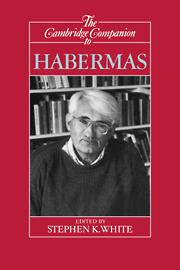9 - Democracy and the Rechtsstaat
from PART IV - DISCURSIVE DEMOCRACY
Published online by Cambridge University Press: 28 May 2006
Summary
One version of the project of radical democracy, which has roots in Rousseau and Marx, has been expressed in the vision of a rational self-organization of society or a “rational collective identity.” Jürgen Habermas has aligned himself with this version in the past and, with some important qualifications, he continues to do so in his new book, Faktizität und Geltung. Two departures from his earlier position, however, particularly stand out: First, Habermas takes great pains to distance himself from the holistic or totalistic conception that often accompanies this version of democracy and in which society is regarded as a kind of macrosubject integrated via a central agency (the state) or organizing principle (labor). Second, the new book assigns to law and the legal community generally a more positive and prominent role in the legitimation process. The first shift results from Habermas's long engagement with Niklas Luhmann's systems theory; the second reflects an increased appreciation for Talcott Parson's identification of the “societal community” (and particularly law) as the primary institutional complex responsible for social integration in highly differentiated and pluralist societies. Consequently, it is no longer society as a whole - not even all governmental bodies - but rather the “association of free and equal consociates under law (Rechtsgenossen)” that becomes simultaneously the primary subject and object - source and target - of democratization. Radical democracy, in short, must practice an art of “intelligent self-restraint” that acknowledges the systemic divisions of modern and highly complex societies by realigning itself in a more creative manner with the liberal Rechtsstaat.
- Type
- Chapter
- Information
- The Cambridge Companion to Habermas , pp. 201 - 232Publisher: Cambridge University PressPrint publication year: 1995
- 22
- Cited by



